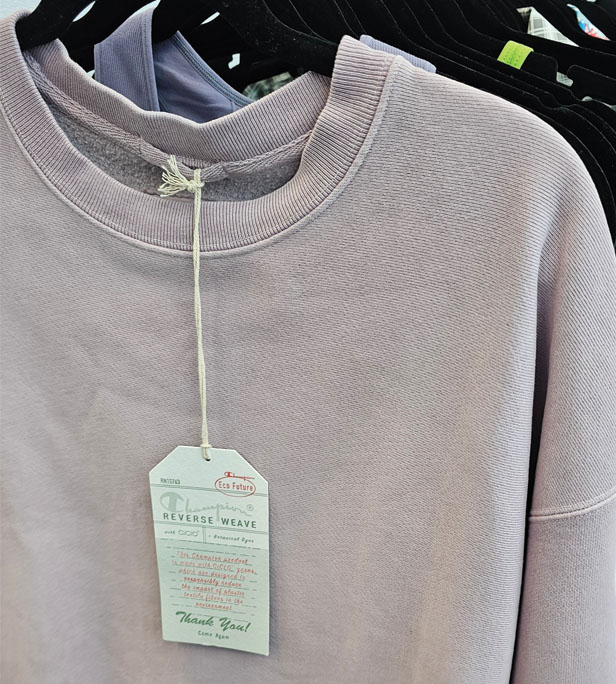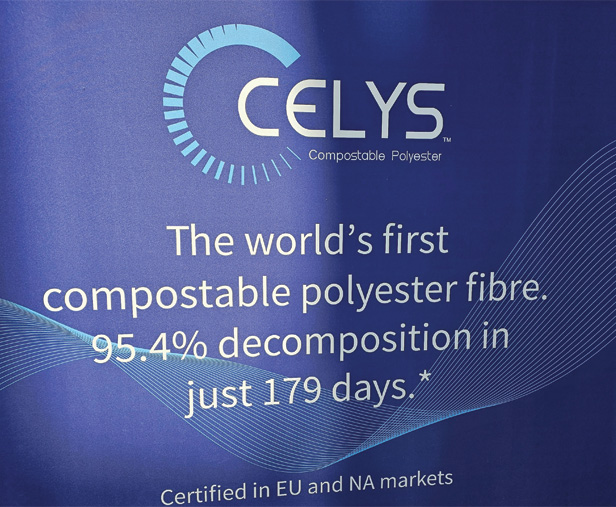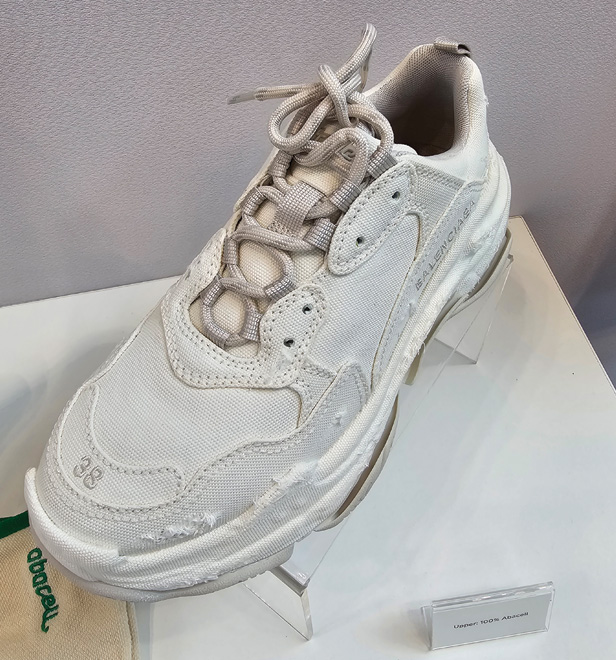Sustainability July 18, 2024
Compostable Polyester & Paper Yarn Among Innovations at Fiber Trade Show
Sustainability was a prominent story at the two-day sourcing show in New York City.
Sustainability was one of the key stories textile makers were telling at the Functional Fabric Fair, an apparel sourcing trade show held July 16-17 at the Javits Center in New York City. The two-day event featured more than 150 suppliers showing off their high-performance functional fabrics and the latest textile development trends.

CiCLO, an additive that biodegrades synthetic fibers, is being used to help prevent microfiber pollution from fleece and other textiles.
Several companies were touting their solutions to bring circularity to synthetic fabrics. For instance, CiCLO, made by Intrinsic Advanced Materials (IAM), is a textile ingredient that can be added to synthetic polymers, creating “countless biodegradable spots in the matrix of the plastic.” The spots, according to the company, “act as pathways that enable naturally occurring microorganisms to break down and digest CiCLO fibers, resulting in the production of basic natural elements.”
The goal, said Cheryl Smyre, director of advanced materials at IAM, is to reduce synthetic microfiber pollution. By some estimates, 92% of the 5.25 trillion plastic particles on the ocean surface are microplastics. Persistent and difficult to trace, microplastics can be harmful to marine life and human health when they enter the food chain.
Untreated synthetic fabrics “will take literally centuries to break down,” Smyre says. By contrast, she adds, textiles treated with CiCLO biodegrade in under four years.
“We’re really putting an end of life to these pollutants,” she says.
The technology is being used in apparel – think T-shirts and fleece – but also has applications in banners and soft signage, Smyre notes.

Australian company CELYS offered compostable polyester fiber.
CELYS, an Australian company, has developed what it says is the world’s first compostable polyester fiber that’s been certified in both the European and North American markets. The fiber achieves 95.4% decomposition in 179 days at industrial composting facilities, according to CELYS.
Helen Weng, global sales director, said the company plans to do further testing to see how the fiber breaks down in other environments as well, and though it’s currently made from virgin materials, the company hopes to make future generations of the fiber from recycled materials.
“We think it could be the future of polyester,” Weng says.
Though much of the show was devoted to synthetic performance fabrics, there was also an array of natural materials. China-based Shepherd, for example, was on hand to explain the benefits of merino wool’s performance qualities in activewear – noting that it’s naturally breathable and heat-regulating, moisture-wicking and odor-resistant. Hemp Fortex displayed a variety of fabrics made by blending hemp with organic cotton, Tencel and recycled polyester. “These natural fibers not only provide moisture absorption and sweat release but also have a positive impact on the environment,” according to the company.

Abacell creates paper yarn made from abaca, a highly renewable species of banana.
Another innovation at the show was paper yarn made from abaca, a perennial species of banana with fibers that can be harvested every three to eight months after an initial growth period of two to three years, according to Abacell. Abaca plants require no fertilizers or pesticides to grow and contribute to soil and water conservation. Fabrics made from the plant offer a variety of performance properties and durability; plus, the yarn is “96% biodegradable during 50 days in controlled composting conditions and 112 days in aqueous medium,” the company notes.

Promo for the Planet is your destination for the latest news, biggest trends and best ideas to help build a more sustainable and socially-responsible industry.
